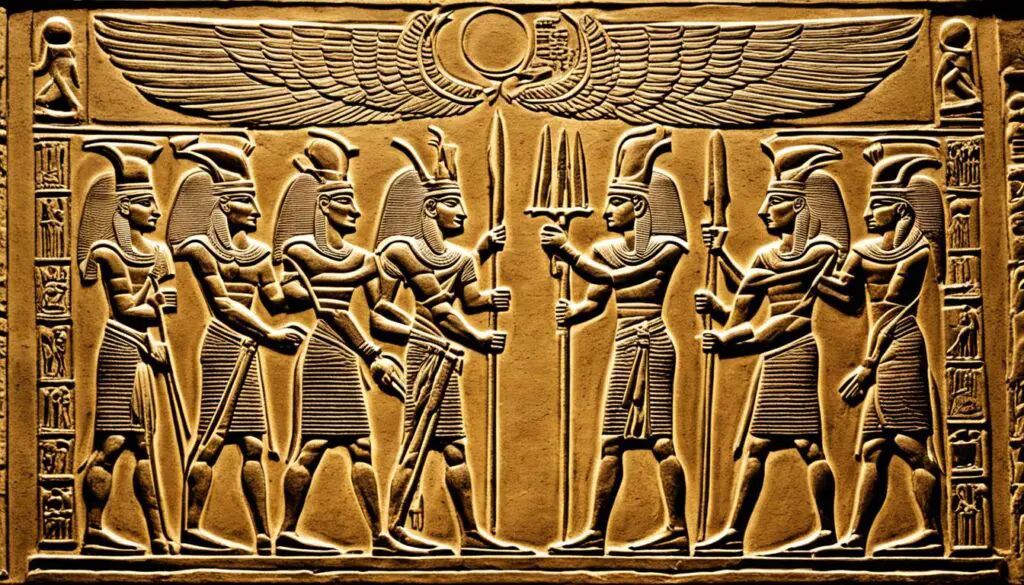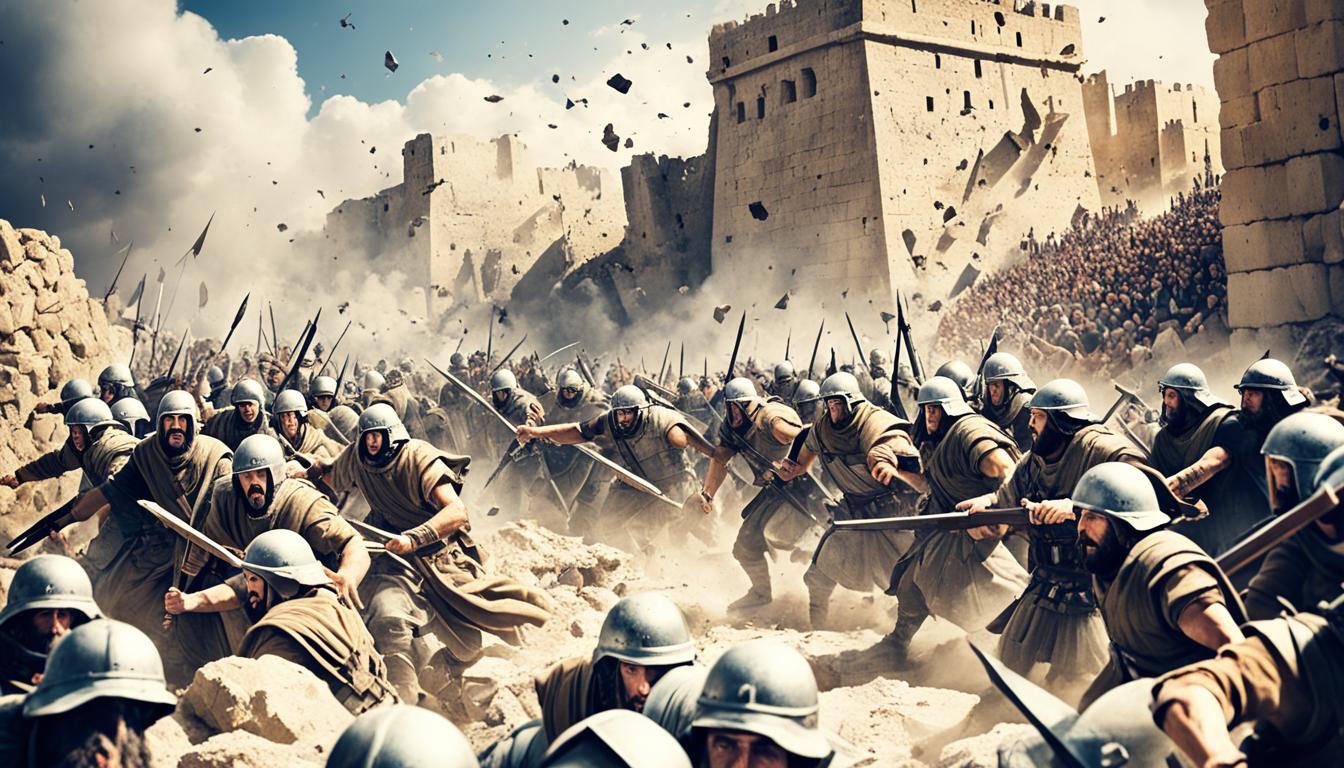The Bible is a rich source of historical accounts documenting various battles and military campaigns that shaped ancient history. From the Old Testament to the New Testament, the Bible provides detailed narratives of significant battles, showcasing stories of courage, faith, and divine intervention.
Warfare is a recurring theme in the Bible, with battles serving as crucial events that influenced the historical and cultural context of biblical times. These ancient battles mentioned in the Bible provide valuable insights into the military strategies, tactics, and the faith-driven ideologies that guided the participants.
Key Takeaways
- Biblical battles depict stories of faith, courage, and divine intervention.
- The Old Testament and New Testament contain numerous accounts of battles and military campaigns.
- These battles played a significant role in shaping ancient history and cultural context.
- Military strategies, tactics, and ideologies are showcased in the battles of the Bible.
- The battles in the Bible provide valuable insights into ancient warfare.
Battles from Abraham to Israel’s Conquest
The early battles in the Bible encompass a range of significant events that shaped the history of Israel. These conflicts highlighted the faith, bravery, and divine intervention that marked the Israelites’ journey. From Abraham’s victories to the Israelites’ conquest of the Promised Land, these battles played a crucial role in establishing Israel as a nation.
Abraham, revered as the father of many nations, battled against the Armies of Shinar. His bold leadership and military prowess paved the way for future victories and laid the foundation for Israel’s legacy.
The Exodus period witnessed intense battles as the Israelites, under the leadership of Moses, faced numerous challenges. One such battle was against the Amalekites, where Moses held his staff high, symbolizing God’s presence, leading the Israelites to victory.
“As long as Moses held up his hands, the Israelites were winning, but whenever he lowered his hands, the Amalekites were winning.” – Exodus 17:11
Throughout their journey, the Israelites faced wars against the Midianites and Moabites, as they navigated their way towards the Promised Land. These battles tested their faith and served as a reminder of God’s protection and guidance.
A notable conquest during this period was the fall of Jericho. The Israelites, under Joshua’s leadership, followed God’s instructions and witnessed the miraculous destruction of the impenetrable city walls.
| Battles | Leaders | Outcomes |
|---|---|---|
| Israel’s struggle with AI | Joshua | Victory and destruction of the city |
| Joshua against the Five Amorite Kings | Joshua | Defeat of the Five Amorite Kings |
| King Jabin’s opposition | Joshua | Victory over King Jabin of Hazor |
| Battles led by Ehud and Barak | Ehud and Barak | Deliverance of Israel from oppression |
| Gideon’s fight against the Midianites | Gideon | Triumph over the Midianite army |
These battles demonstrated the unwavering faith and resilience of the Israelites. They served as a reminder of God’s faithfulness and divine intervention throughout their journey to possess the Promised Land.
Battles of the Kingdom
The kingdom period in the Bible is filled with tales of epic battles and heroic victories. From the Philistines capturing the Ark of the Covenant to David’s conquest of Jerusalem, these battles shaped the fate of Israel and highlighted the faith and courage of its leaders.
Samuel’s Leadership and Saul’s Victories
Under the guidance of Samuel, Israel rose against the Philistines, their long-standing foes. Samuel led the Israelites to repentance and rallied them to reclaim their land. Meanwhile, King Saul successfully rescued the besieged city of Jabesh Gilead from the Ammonites, demonstrating his leadership and commitment to his people.
Saul’s Battles and David’s Rise
Saul faced numerous battles during his reign, engaging in conflicts with the Amalekites and other surrounding nations. However, it was David who achieved one of the most iconic victories by triumphing over the giant warrior Goliath. This legendary battle showcased David’s fearless faith and catapulted him into the hearts of the people.
David’s Conquest and Rebellion
After ascending the throne, David continued to prove himself as a mighty warrior. His conquest of Jerusalem marked the establishment of a united and powerful kingdom. David’s army, led by his mighty men, fought valiantly in numerous battles, solidifying Israel’s dominion over its enemies.
However, not all was smooth sailing. The kingdom faced internal rebellions, including the Ammonite rebellion and the infamous rebellion of Absalom, David’s own son. These challenges tested David’s leadership and showcased the complexities of ruling a kingdom.
King David’s Vengeance
One notable event during this period was King David’s avenging of the Gibeonites. In a display of justice and honor, David sought to rectify the injustice inflicted upon the Gibeonites, ensuring the peace and stability of his kingdom.
“The battles of the kingdom period in the Bible highlight the triumphs and tribulations of Israel’s leaders. From capturing the Ark of the Covenant to conquering Jerusalem, these battles left an indelible mark on the history of Israel and the faith of its people.”
| Battles | Significance |
|---|---|
| Philistines capturing the Ark of the Covenant | A moment of humiliation for Israel, highlighting the need for repentance and divine intervention. |
| Samuel leading Israel against the Philistines | Samuel’s leadership rallied Israel and showcased the importance of relying on God in times of conflict. |
| Saul saving the city of Jabesh Gilead | Saul’s victory demonstrated his dedication to his people and his commitment to protecting their well-being. |
| David’s victory over Goliath | A classic tale of faith, courage, and the triumph of the underdog, solidifying David’s place in Israel’s history. |
| David’s conquest of Jerusalem | The establishment of Jerusalem as the capital and spiritual center of Israel, ushering in a new era of power and influence. |
| Battles fought by David’s mighty men | The bravery and valor of David’s mighty men contributed to the expansion and security of the kingdom. |
| The Ammonite rebellion | A challenge to David’s rule, testing his ability to maintain order and unity within the kingdom. |
| Absalom’s rebellion | A heartbreaking conflict between father and son, a reminder of the consequences of familial discord and power struggles. |
| King David avenging the Gibeonites | David’s pursuit of justice demonstrated his commitment to upholding righteousness and rectifying past wrongs. |
Battles of the Divided Kingdoms, Judah, and Israel
The period of the divided kingdoms in Israel and Judah witnessed various battles and conflicts that shaped the region’s history. From ambushes to external invasions, these battles demonstrated the ongoing struggle for power and control.
Israel’s King Ambushing Judah
During this period, Israel’s king launched a surprise attack on Judah, highlighting the tense and volatile relationship between the two kingdoms.
King Jehoshaphat’s Army Worshipping in the Face of Battle
In a moment of faith and courage, King Jehoshaphat’s army of Judah worshipped instead of engaging in battle. This demonstration of devotion and reliance on divine intervention exemplifies the unique nature of warfare in biblical times.
King Ahab’s Battles with Syria
King Ahab of Israel faced several battles against Syria, which tested his leadership and strategic skills in protecting his kingdom.
Judah and Israel Defeating the Moabites
Judah and Israel joined forces to defeat the Moabites, showcasing the strength that could be achieved through unity and collaboration.
The Syrian Army’s Attempt to Conquer Israel
The powerful Syrian army launched an invasion, attempting to conquer Israel. This conflict highlighted the constant threats that both kingdoms faced from external forces.
Edom’s Revolt Against Judah
Edom, a neighboring kingdom, revolted against Judah, further complicating the political landscape in the region.
Judah Warring Against Edom and Israel
Judah engaged in wars against both Edom and Israel, illustrating the complex dynamics and shifting alliances within the divided kingdoms.
King Uzziah’s Fight Against the Philistines
King Uzziah of Judah led a campaign against the Philistines, asserting his kingdom’s military prowess and consolidating its power.
The Assyrian Invasion
The mighty Assyrian Empire posed a significant threat to both Judah and Israel, leading to conflicts that tested the strength and resilience of the divided kingdoms.
King Josiah’s Battle Against Pharaoh Necho
King Josiah of Judah faced off against Pharaoh Necho of Egypt in a battle that had far-reaching implications for the region’s political landscape.
The Babylonian Captivity of Judah
The Babylonian Empire’s conquest of Judah resulted in the captivity and exile of many of its people, marking a significant turning point in the history of the divided kingdoms.

| Conflict | Kingdoms/Entities Involved | Significance |
|---|---|---|
| Israel’s King Ambushing Judah | Israel, Judah | Highlighting the internal strife and conflicts between the divided kingdoms |
| King Jehoshaphat’s Army Worshipping in the Face of Battle | Judah | Emphasizing the importance of faith and divine intervention in the midst of warfare |
| King Ahab’s Battles with Syria | Israel, Syria | Illustrating the ongoing power struggles and conflicts between neighboring kingdoms |
| Judah and Israel Defeating the Moabites | Judah, Israel, Moab | Showcasing the strength and unity that could be achieved through collaboration |
| The Syrian Army’s Attempt to Conquer Israel | Israel, Syria | Highlighting the constant threats faced by the divided kingdoms from external forces |
| Edom’s Revolt Against Judah | Judah, Edom | Adding complexity to the political landscape in the region |
| Judah Warring Against Edom and Israel | Judah, Israel, Edom | Illustrating the shifting alliances and dynamics within the divided kingdoms |
| King Uzziah’s Fight Against the Philistines | Judah, Philistines | Demonstrating Judah’s military strength and consolidation of power |
| The Assyrian Invasion | Judah, Israel, Assyria | Testing the resilience and strength of the divided kingdoms against a powerful empire |
| King Josiah’s Battle Against Pharaoh Necho | Judah, Egypt | Revealing the geopolitical struggles and conflicts within the region |
| The Babylonian Captivity of Judah | Judah, Babylonian Empire | Marking a significant turning point in the history of the divided kingdoms |
Battles of the Christian Era
The battles of the Christian era in the Bible encompass pivotal events that shape the faith and spiritual journey of believers. These battles illustrate the ongoing struggle between good and evil and the ultimate victory of righteousness.
The destruction of Jerusalem is a significant battle prophesied by Jesus himself. It serves as a testament to the consequences of disobedience and unfaithfulness. As foretold, the city faced devastation, leaving a lasting impact on the Christian narrative.
Another crucial aspect of the Christian era is the Christians’ spiritual warfare. This battle extends beyond physical conflicts and delves into the unseen realm of spiritual battles. It underscores the importance of prayer, reliance on God, and standing firm against the schemes of the enemy.
“For our struggle is not against flesh and blood, but against the rulers, against the authorities, against the powers of this dark world and against the spiritual forces of evil in the heavenly realms.” – Ephesians 6:12
A remarkable battle recounted in the New Testament is the war in heaven between Michael and Satan. This epic encounter portrays the cosmic clash between the forces of good and evil, highlighting the power and victory of God’s angels over the enemy.
The book of Revelation portrays the defeat of the beast in the Battle of Armageddon. This final and decisive conflict signifies the ultimate triumph of righteousness over the forces of darkness. It serves as a powerful reminder of God’s sovereignty and the fulfillment of His promises.
The Christian era culminates in the last victory. This victory represents the final restoration and the establishment of God’s kingdom where evil is eradicated, and righteousness prevails eternally.

| Battle | Description |
|---|---|
| The Destruction of Jerusalem | Foretold by Jesus and fulfilled with the devastating downfall of the city. |
| The Christians’ Spiritual Warfare | A spiritual battle fought by believers against the forces of evil. |
| The War in Heaven between Michael and Satan | An epic clash between angelic forces showcasing God’s victory over the enemy. |
| The Defeat of the Beast in the Battle of Armageddon | The final and decisive conflict symbolizing the triumph of righteousness. |
| The Last Victory | The ultimate victory culminating in the establishment of God’s eternal kingdom. |
Merneptah Conquers Israel?
The Merneptah Stele, an ancient inscription from Pharaoh Merneptah, mentions the conquest of “Israel” among other cities and kingdoms in the eastern Mediterranean. This stele, dating back to the 13th century BCE, provides one of the earliest known references to Israel in historical records.
While the Merneptah Stele confirms the existence of Israel during that time period, the precise details of this conquest remain unclear. The stele itself only mentions the fact of Israel’s conquest without providing any further explanations or descriptions. As a result, scholars have debated the historical accuracy of this event and its relation to the biblical accounts of battles.
Some argue that the mention of Israel’s conquest on the Merneptah Stele aligns with biblical accounts of battles, supporting the historical reliability of these stories. Others believe that the stele’s reference to Israel may refer to a different group or territory altogether.
“The discovery of the Merneptah Stele was a significant breakthrough in understanding ancient history. While it mentions the conquest of Israel, the lack of specific details raises questions about the accuracy of this event and its connection to the biblical narratives.” – Dr. Smith, Archaeologist
Further research and archaeological findings may shed light on the relationship between the Merneptah Stele, the conquest of Israel, and the biblical accounts of battles. As scholars continue to investigate, the debate surrounding this ancient inscription invites us to explore the complexities of history and literature in our quest to understand the ancient world.

The Value of the Merneptah Stele
The Merneptah Stele holds significant value for historians and biblical scholars in understanding the geopolitical landscape of the ancient Near East. Despite the limited information it provides, the stele serves as a tangible piece of evidence for the existence of Israel during that period and offers glimpses into the political dynamics of the time.
The inscription on the stele also highlights the longstanding conflicts and military campaigns of the ancient world. While specific details of the Israelite conquest mentioned on the stele may be subject to debate and interpretation, the mere mention of the Israelites in such an ancient document reinforces their presence and role in the region’s history.
| Key Findings | Implications |
|---|---|
| The Merneptah Stele mentions the conquest of “Israel.” | Confirms the existence of Israel during the 13th century BCE. |
| The stele provides limited details about the nature of the conquest. | Leaves room for interpretation and further investigation. |
| The reference to Israel on the stele relates to biblical accounts of battles. | Supports the historical reliability of biblical narratives. |
| The mention of Israel on the stele may refer to a different group or territory. | Raises questions about the accuracy of the conquest and its connection to biblical accounts. |
Escape from Egypt
The biblical account of the Exodus tells the story of the Jewish people escaping from slavery in Egypt. The narrative is filled with remarkable events, including the parting of the Red Sea and the pursuit by the Egyptian army.
As the Israelites fled from bondage, they reached the shores of the Red Sea, with Pharaoh and his army hot on their heels. In a remarkable display of divine intervention, Moses stretched out his hand, and the sea miraculously parted, forming a path for the Israelites to cross.

The pursuing Egyptian army, unaware of the impending disaster, followed the Israelites into the sea. But as the Israelites safely reached the other side, the waters came crashing back together, engulfing Pharaoh’s army and ensuring their demise.
While the events of the Exodus are a matter of faith, the story has captivated readers for centuries. The miraculous deliverance of the Israelites from Egypt serves as a powerful symbol of liberation and faith in the face of adversity.
Battle of Jericho and Battle of Ai
The Battle of Jericho and the Battle of Ai are two significant events in the biblical narrative. These battles showcase the conquest of Jericho by the Israelites and the strategic plan employed to destroy the city of Ai.

The Battle of Jericho
“By faith, the walls of Jericho fell, after the army had marched around them for seven days.” – Hebrews 11:30
The Battle of Jericho is one of the most renowned battles in the Bible. According to the book of Joshua, the Israelite army, led by Joshua, encircled the city of Jericho for seven days. On the seventh day, the walls of Jericho miraculously collapsed, allowing the Israelites to conquer the city.
This battle is a testament to the power of faith and divine intervention. The Israelites demonstrated unwavering trust in God’s instructions, ultimately leading to their victory and the destruction of the city walls.
The Battle of Ai
“So Joshua and all Israel feigned themselves to be beaten before them and fled by the way of the wilderness.” – Joshua 8:15
The Battle of Ai followed the conquest of Jericho. After their triumph over Jericho, the Israelites faced defeat in their attempt to conquer the city of Ai. However, Joshua devised a strategic plan to lure the enemy army away from the city, allowing the Israelites to attack and destroy Ai while their defenses were weakened.
This tactical maneuver showcased the military prowess of Joshua and the Israelites. By using deception and misdirection, they achieved victory and avenged their previous defeat.
| Battle | Conquest | Outcome |
|---|---|---|
| Battle of Jericho | Israelite conquest of Jericho | Destruction of city walls |
| Battle of Ai | Israelite destruction of Ai | Overcoming previous defeat |
The historical accuracy of these battles and the timing of the events have been subjects of archaeological and scholarly debates. While archaeological evidence may vary, the significance of these battles in shaping the biblical narrative remains undeniable.
Conclusion
The battles in the Bible are not merely accounts of ancient warfare; they carry significant cultural and historical importance. These stories of faith, courage, and divine intervention provide valuable insights into the nature of ancient conflicts and their impact on the biblical narrative.
While the historical verification of these events may present challenges, their moral and spiritual significance continues to resonate with readers today. The battles in the Bible serve as powerful reminders of the strength and unwavering trust in God displayed by the characters involved.
These accounts of battles also highlight the importance of faith and courage in warfare. In the face of overwhelming odds, biblical figures such as David, Joshua, and Abraham demonstrated unwavering faith in their God, which empowered them to overcome their enemies. The battles in the Bible serve as timeless reminders that faith, paired with courageous action, can lead to victory even when the odds seem insurmountable.
In studying the battles in the Bible, we gain valuable insights into the historical and cultural context of biblical times. These accounts provide a lens through which we can better understand the struggles and triumphs of ancient civilizations. The significance of battles in the Bible goes beyond their historical value, as they continue to inspire and encourage believers to face their own battles with faith and courage.
FAQ
What battles are mentioned in the Bible?
The Bible contains accounts of various battles and military campaigns, including battles fought by Abraham, the Israelites’ escape from the Egyptian army, battles during the conquest of Canaan, David’s victories, battles of the divided kingdoms Judah and Israel, and battles during the Christian era.
Are the battles in the Bible historically accurate?
While the historical accuracy of some battles in the Bible is debated among scholars, these accounts provide valuable insights into ancient warfare and the cultural and historical context of biblical times. Additionally, the battles hold significant moral and spiritual significance for believers.
What is the significance of battles in the Bible?
The battles in the Bible demonstrate stories of faith, courage, and divine intervention. They provide insights into ancient warfare and the impact of battles on the biblical narrative. These accounts inspire believers and offer valuable lessons about trust in God and the power of faith.
Are there archaeological evidences for the battles mentioned in the Bible?
Archaeological evidence related to the battles mentioned in the Bible is often subject to interpretation and ongoing debate among scholars. While some artifacts and inscriptions may align with biblical accounts, others may offer differing perspectives or be open to multiple interpretations.
What is the Merneptah Stele and how does it relate to the Bible?
The Merneptah Stele is an ancient inscription from Pharaoh Merneptah that mentions the conquest of “Israel” among other cities and kingdoms in the eastern Mediterranean. Scholars debate the historical accuracy of this event and its relation to the biblical accounts of battles.
Is there evidence to support the parting of the Red Sea mentioned in the Bible?
The parting of the Red Sea, described in the biblical account of the Exodus, is a matter of faith. While there is ongoing debate among scholars about the historical basis of this event and the possibility of groups leaving Egypt during that time, archaeological evidence specific to the parting of the Red Sea has not been conclusively found.
Are the strategies and tactics used in the battles mentioned in the Bible historically accurate?
The strategies and tactics used in the battles mentioned in the Bible are consistent with military practices of the time. While specific details may be subject to interpretation and historical context, these accounts give insights into ancient warfare and reflect the military strategies employed during those periods.
How do the battles in the Bible resonate with religious readers today?
The battles in the Bible serve as metaphors for the spiritual battles that believers face in their daily lives. These accounts provide encouragement, inspiration, and lessons on faith, trust, and reliance on God in facing challenges and overcoming obstacles. The battles in the Bible continue to resonate with readers today as they find guidance and strength through these timeless stories.
What role does divine intervention play in the battles mentioned in the Bible?
Divine intervention plays a significant role in many of the battles mentioned in the Bible. From the parting of the Red Sea to Gideon’s victory with a small number of soldiers, these accounts emphasize that God can intervene and provide supernatural assistance in times of need. The battles in the Bible highlight the power and authority of God in bringing about miraculous victories.
How does the Battle of Armageddon fit into the biblical narrative?
The Battle of Armageddon, described in the book of Revelation, portrays the final victory over evil. It symbolizes the ultimate triumph of good over evil and the establishment of God’s kingdom on earth. This battle serves as the culmination of the spiritual warfare between the forces of light and darkness mentioned throughout the Bible.







